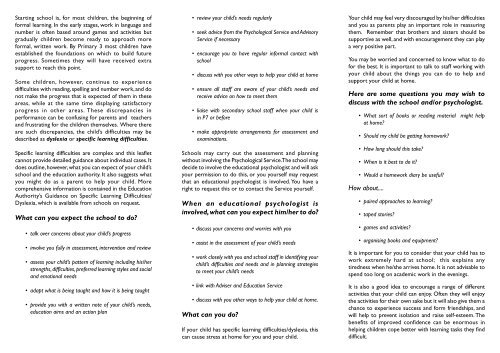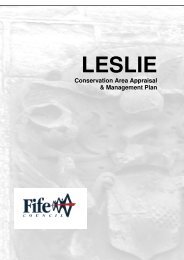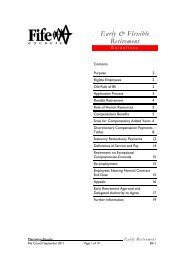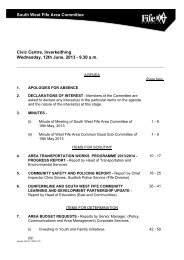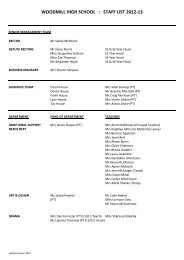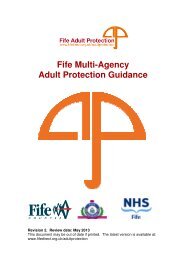dyslexia leaflet - Home Page
dyslexia leaflet - Home Page
dyslexia leaflet - Home Page
You also want an ePaper? Increase the reach of your titles
YUMPU automatically turns print PDFs into web optimized ePapers that Google loves.
Starting school is, for most children, the beginning offormal learning. In the early stages, work in language andnumber is often based around games and activities butgradually children become ready to approach moreformal, written work. By Primary 3 most children haveestablished the foundations on which to build futureprogress. Sometimes they will have received extrasupport to reach this point.Some children, however, continue to experiencedifficulties with reading, spelling and number work, and donot make the progress that is expected of them in theseareas, while at the same time displaying satisfactoryprogress in other areas. These discrepancies inperformance can be confusing for parents and teachersand frustrating for the children themselves. Where thereare such discrepancies, the child’s difficulties may bedescribed as <strong>dyslexia</strong> or specific learning difficulties.Specific learning difficulties are complex and this <strong>leaflet</strong>cannot provide detailed guidance about individual cases. Itdoes outline, however, what you can expect of your child’sschool and the education authority. It also suggests whatyou might do as a parent to help your child. Morecomprehensive information is contained in the EducationAuthority’s Guidance on Specific Learning Difficulties/Dyslexia, which is available from schools on request.What can you expect the school to do?• talk over concerns about your child’s progress• involve you fully in assessment, intervention and review• assess your child’s pattern of learning including his/herstrengths, difficulties, preferred learning styles and socialand emotional needs• adapt what is being taught and how it is being taught• provide you with a written note of your child’s needs,education aims and an action plan• review your child’s needs regularly• seek advice from the Psychological Service and AdvisoryService if necessary• encourage you to have regular informal contact withschool• discuss with you other ways to help your child at home• ensure all staff are aware of your child’s needs andreceive advice on how to meet them• liaise with secondary school staff when your child isin P7 or before• make appropriate arrangements for assessment andexaminations.Schools may carry out the assessment and planningwithout involving the Psychological Service. The school maydecide to involve the educational psychologist and will askyour permission to do this, or you yourself may requestthat an educational psychologist is involved. You have aright to request this or to contact the Service yourself.When an educational psychologist isinvolved, what can you expect him/her to do?• discuss your concerns and worries with you• assist in the assessment of your child’s needs• work closely with you and school staff in identifying yourchild’s difficulties and needs and in planning strategiesto meet your child’s needs• link with Adviser and Education Service• discuss with you other ways to help your child at home.What can you do?If your child has specific learning difficulties/<strong>dyslexia</strong>, thiscan cause stress at home for you and your child.Your child may feel very discouraged by his/her difficultiesand you as parents play an important role in reassuringthem. Remember that brothers and sisters should besupportive as well, and with encouragement they can playa very positive part.You may be worried and concerned to know what to dofor the best. It is important to talk to staff working withyour child about the things you can do to help andsupport your child at home.Here are some questions you may wish todiscuss with the school and/or psychologist.• What sort of books or reading material might helpat home?• Should my child be getting homework?• How long should this take?• When is it best to do it?• Would a homework diary be useful?How about....• paired approaches to learning?• taped stories?• games and activities?• organising books and equipment?It is important for you to consider that your child has towork extremely hard at school; this explains anytiredness when he/she arrives home. It is not advisable tospend too long on academic work in the evenings.It is also a good idea to encourage a range of differentactivities that your child can enjoy. Often they will enjoythe activities for their own sake but it will also give them achance to experience success and form friendships, andwill help to prevent isolation and raise self-esteem. Thebenefits of improved confidence can be enormous inhelping children cope better with learning tasks they finddifficult.
What can other agencies do?This <strong>leaflet</strong> may be useful for other agencies (for exampledoctors or social workers) in outlining how the educationservice responds to <strong>dyslexia</strong>/specific learning difficulties.An agency who is involved with a pupil who may havethese difficulties should encourage you, as parents, todiscuss this with the school. At times this may extend tothe agency indicating to the school that in theirprofessional judgement the young person may be dyslexic.This would not, however, extend to assessment as that isan educational responsibility, held by the school and theeducation service.Prepared by Fife Education Servicewith Dyslexia FifeDyslexia FifeParents often find it helpful to talk to a person in the samesituation. Dyslexia Fife is a voluntary organisation whichaims to offer advice and support as well as to increase theunderstanding of and provision for people who aredyslexic. Dyslexia Fife is very pleased to be working withFife Council and welcomes the progress made in thinkingand practice in the field of <strong>dyslexia</strong>.Some useful phone numbers:Fife Council Psychological ServiceCupar: 01334 412000Dunfermline: 01383 312800Kirkcaldy: 01592 412500Fife Council Advisory ServiceTelephone: 01592 414600Specific Learning DifficultiesDYSLEXIAA Parents’LeafletDyslexia FifeTelephone: 01337 860260


